 The other day a well-educated friend asked me about what book to give her soon-to-be heading off to college daughter. Just a few short months ago, she was mostly known as a high school graduate; within a few weeks she will be a first year college student. It’s a big transition and a new identity, freighted with all kinds of joys, concerns, fears, excitement, opportunities, shaped by that biggee: change. Ch-ch-ch changes, indeed.
The other day a well-educated friend asked me about what book to give her soon-to-be heading off to college daughter. Just a few short months ago, she was mostly known as a high school graduate; within a few weeks she will be a first year college student. It’s a big transition and a new identity, freighted with all kinds of joys, concerns, fears, excitement, opportunities, shaped by that biggee: change. Ch-ch-ch changes, indeed.
I won’t wax on and on about all this — you probably know I’ve written a lot about college ministry and young adults and such before.
So, without further ado, here is a quick little list which I think you can trust. Four great books to give to any kid going off to college this month. I bet they’d appreciate it. Order from us today by clicking on the link at the bottom. We’ll do a 10% discount, and ship your order out right away. See how easy we’re making this for you? You were wondering what to give her or him, weren’t you?
FOUR BOOKS FOR FOUR YEARS
These are listed in order of their “level” so that you could give the first to a first year student, the next to a sophomore, the next to a somewhat more advanced (but still young) student, and the last to a more serious senior. More or less, anyway. Sound good?
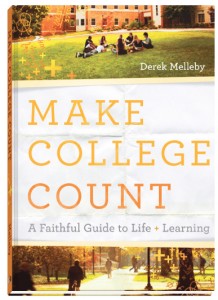 Make College Count
Make College Count Derek Melleby (Baker Books) $12.99 Okay, okay, I’ve mentioned this a lot over the years. Derek is one of my best friends. Our bookstore is mentioned in it as a resource for young adults trying to make their way as a responsible, thoughtful faithful college student. Still, as unbiased as I can be, I want to insist that it truly is the best book of its kind, the only really great book I know of that I’d give to a recent high school grad that is a general sort of introduction to the biggest questions to ask and answer as one is entering college.Melleby’s
MCC is Ideal for those heading to school for the first time although some entering their second year might even like it.
I know many a parent or youth pastor or older sibling wants to offer this kind of profound (but not preachy) encouragement to a student they love, helping them to make the most of these so-called critical years. This book will provide you with this great opportunity to raise these good questions and offer some last-minute guidance. I think you’ll feel good sending it.
In this lovely, interesting, compact-sized, hardback, Melleby invites students to consider these seven questions (notice the subtitles to each chapter which illustrate where he’s going with each inquiry.)
1. What Kind of Person Do You Want to Become?
Following Jesus During the Critical Years
2. Why Are You Going to College?
Finding Your Place in God’s Story
3. What Do You Believe?
Taking Ownership of Your Faith
4. You Are You?
Securing Your Identity in Christ
5. With Whom Shall You Surround Yourself
Connecting with Christian Community
6. How Will You Choose a Major?
Putting Your Faith into Action
7. How Do You Want Your Life to Influence Others
Leaving a Legacy
I like this from the publisher’s promo info: “There’s more to college than classes, credits, and a nonstop social
life. It’s more than getting a degree to improve one’s job prospects.
College is a time where students develop into the adults they will be
for the rest of their lives, a time to explore the big questions about
life and human destiny, a time when they form their character and faith.”
I’m not alone in promoting this great little volume. Here’s a few rave reviews from some of the most knowledgeable and reliable voices in young adult ministry:
“For years I have been looking for the right book to give to Christian
high school grads: readable, real, honest, grace-focused,
Christ-centered, and practical. Finally, I’ve found just the ticket–Make College Count is that book.” Chap Clark, author of Hurt: Inside the World of Today’s Teenagers; professor of youth, family, and culture, Fuller Theological Seminary
“Christian
college students hear a lot about what to avoid during their college
years. So it’s refreshing to encounter a book that explains what
students should embrace in college. It’s clear that Derek Melleby
understands the world of today’s students.” Joseph M. Stowell,
president of Cornerstone University
“Make College Count is
just right! What Derek Melleby has done is find a way to come alongside
someone on the way to college and offer guidance about things that
matter most.” Steven Garber, director of The Washington Institute for
Faith, Vocation & Culture; author of The Fabric of Faithfulness and Visions of Vocation.
“Make College Count offers
an accurate preview of college life and encourages and equips students
to thoughtfully make the most of college (and the rest of their lives)
by embracing a real and vibrant faith that’s not an extracurricular
add-on but a foundation for all of life. This could be the most
important book students read during their college years.” Walt Mueller,
president, Center for Parent/Youth Understanding
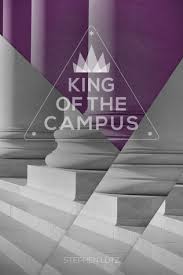 King of the Campus Stephen Lutz (House Studio) $14.99 Again, I’ve suggested this before and carry it to any event where we sell books to college students. My own blurb on the back shouts my enthusiasm: there isn’t any other book on the market that does what this very cool paperback does. Yeah!
King of the Campus Stephen Lutz (House Studio) $14.99 Again, I’ve suggested this before and carry it to any event where we sell books to college students. My own blurb on the back shouts my enthusiasm: there isn’t any other book on the market that does what this very cool paperback does. Yeah!
What I mean by this is that there are some books that ask foundational questions (like Melleby, above) and some that are mostly about basic Christian discipleship, how to not party or have sex or stop going to church. And some excellent ones that offer a reminder that God cares about the classroom (see below) and the life of the mind. Lutz, in his missional vision to invite students to join with God to honor Christ’s Lordship and discover God’s redemptive purposes on campus and at college, does all of the above. Yes, there’s solid stuff here about basic discipleship, helping readers understand grace and revel in gospel good news. Yes, there’s some practical advice about habits and character and growing in personal faith — but wise and thoughtful, in the context of the kinds of stuff Melleby writes about. It’s solid. And, happily, there is a nice section about studies, about academics, about thinking well and studying faithfully, for God’s glory and our neighbors good. Yep, King of the Campus is a gospel-centered, Kingdom-vision kind of book about living for Christ in college. And it is fantastic, mature, interesting, and a great study. I really do recommend it.
Here is what the publisher says:
God’s purpose for you at college isn’t merely to get an education. It’s
to join him in the work he’s already doing there. You have been gifted
and shaped to participate in the kingdom of God right now, on your
campus.
In
King of the Campus, author Stephen Lutz considers why the
kingship of Christ really matters, and examines what it looks like to
have Jesus as King over five key areas of university life:
Church and Christian fellowship
Relationships
Academics and work
Organizational leadership
Partying and pleasure
The
story God has for you is bigger and more compelling than a list of do’s
and don’ts. Learn to thrive as you partner with God in the change he is
bringing to your life,to your campus, and to the world.
Sounds good, eh? Steve has worked at Penn State University with the CCO and I know him and trust him. This book emerges from his own intense work on campus and his own passion to be a church planter amidst the university culture. If you know a Christian student, this hard-to-find, little known book (colorfully written by a Reformed guy, on a Nazarene publishing house, quoting pop culture and N.T. Wright!) would make a fantastic gift.
Here is a link to Steve Lutz’s webpage that shows more about the book. You will see some really great endorsements there, including my own. Enjoy.
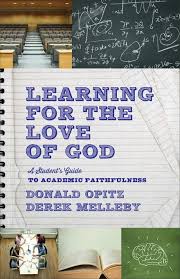 Learning for the Love of God: A Student’s Guide to Academic Faithfulness Donald Opitz & Derek Melleby (Brazos Press) $14.99 I wonder if there is any other book I so enjoy selling, feel so glad to get into the hands of young students? It is not ponderous or weighty but has the potential to revolutionize lives, faiths, and futures. I really believe in the power of this book, and want to invite you to send some out to college students you love.
Learning for the Love of God: A Student’s Guide to Academic Faithfulness Donald Opitz & Derek Melleby (Brazos Press) $14.99 I wonder if there is any other book I so enjoy selling, feel so glad to get into the hands of young students? It is not ponderous or weighty but has the potential to revolutionize lives, faiths, and futures. I really believe in the power of this book, and want to invite you to send some out to college students you love.
Just last week I was doing a three hour workshop with an energetic group of college students, using some of this material to invite them to think about using their minds more deeply and thinking well about how to be a student for God’s glory. They had the book, and were not unfamiliar with some of its themes. (“Recall how Bach signed all his music soli dei gloria,” I said, quoting a section of this book, and then asked what it would be like for them to see their academic life — writing papers, doing textbook reading, lab experiments, studio work, computer stuff, class projects — in a manner that naturally integrates a Biblical vision of life and a Christian worldview into the work they are doing. What obstacles would have to be overcome to serve God in the classroom. In fact, we went over a list of things that other students came up with that is an appendix in the book. It was a really interesting conversation, believe me. Time ran out so we missed to the “liturgy for learning” that is also in the book. Oh how I wanted to read that out loud together as a closing blessing on these young scholars.
I got a little choked up explaining (in a way I suspect they didn’t fully grasp) why it is so very, very meaningful to me that this book is dedicated to me. I’m not bragging, but affirming that these two authors gave me a great, great gift and a boatload of affirmation in doing that. Optiz and Melleby are esteemed friends — Optiz is surely one of the smartest guys I know with an advanced theological degree from Gordon Conwell and a PhD in sociology under Peter Berger, and a gifted, colorful writer, and Derek is truly one of the most energetic, thoughtful, and impactful young men I know; his work with the CCO, and the the Center for Parent & Youth Understanding and now with the OneLife gap year program is nothing short of extraordinary. (Oh yes, did I mention he wrote a lovely little book called Make College Count?) Interestingly, both have a pretty stellar former basketball careers, or so I’ve heard.
Both of these authors are excellent translators of often daunting concepts gleaned from serious philosophical reading, allowing serious stuff into accessible and even enchanting lines. That is, Learning for the Love of God is a fun read, even funny at times, with tons of stories and lots of “on ramps” for learning and pondering and taking fresh steps. It’s not heady or dry. Yet, this whole idea — academic faithfulness, as they put it — is considered “outrageous” by many. They make it sound normal, or at least a high and holy adventure: learning for the love of God.
I have explained in greater detail elsewhere why I think this book is so very important. I sure hope somebody sends some out to some college students this week. It is good and it is important; it is a vital rebuttal to both sentimental faith that implies Christianity is mostly about one’s inner piety and not intellectually interesting and a rebuttal to the dualisms that suggest God doesn’t really care about art or science or engineering or communications or business or physical therapy or law or education.
I’m not alone in saying this, that this book is life changing and useful. The wise and good little book isn’t as known as it ought to be, and others who follow and study the world of nurturing young adults making the transition to college say so, too.
James K.A. Smith (author of You Are What You Love) says:
What does discipleship have to do with learning? How do I follow Jesus
“as a student”? What does the Lord require of me at university? This
marvelous book answers just these sorts of questions. It’s one of a
kind, an expansive vision of Christian learning written not for
professors but for students. Best of all, this is a book that can profit
students in any educational context, secular or religious. Buy a box of
these and give them to every high school senior you know.
And listen to CPYU founder and director Walt Mueller, again a person I respect very, very deeply, who knows better than most the need for this sort of stuff to be written for beginner students:
This book addresses numerous timely issues related to college
transition, the place of academics in the life of the Christian student,
and the development of a lifelong Christian perspective on issues of
calling and vocation. Nothing I have seen yet addresses these particular
issues with the combination of theological depth and easy accessibility
that marks this book.
Here is one review of
Learning for the Love of God: A Student’s Guide... written by a former campus worker, Bob Trube from his “Bob on Books” blog — very fair and nicely explanatory.
Here, I ruminate in a longish essay on a large handful of books (including Steve Garber’s then brand new Visions of Vocation, and tell quite a bit about why I so love Melleby & Optiz and their then brand new Learning for the Love of God. Pull up a chair and enjoy.
WHAT’S NEXT? FOLLOWING THE FOOTNOTES
Okay, if by some grand blessing in life your beloved young one read Make College Count before their freshman year, and took up serious Christian discipleship in (but not of) the ethos of the college campus by studying King of the Campus and then moved on to buckle down with Learning for the Love of God in their second or third year, what next?
Well, let’s just suppose they read the books recommended by those authors — for instance, Greg Jao’s wonderful, brief, inexpensive must-read booklet Your Mind’s Mission (IVP; $7.00) or Neal Plantinga’s eloquent, profound, beautiful Engaging God’s World: A Christian Vision of Faith, Learning, and Living (Eerdmans; $16.00.) They’ve picked up some curiosity from those books, checked out the footnotes seeing who they drew upon and circled back and read some things on worldview — most likely The Transforming Vision: Shaping a Christian Worldview by Brian Walsh & Richard Middleton (IVP; $22.00) or Al Wolter’s Creation Regained: Biblical Basics for a Reformational Worldview (Eerdmans; $15.00.) Hopefully, they’ve noticed Andy Crouch’s Culture Making: God’s Creative Calling (IVP; $22.00) along the way, as his books have been influential. Maybe they’ve discovered Os Guinness’ rich, rich volume, The Call: Finding and Fulfilling the Central Purpose of Your Life (W Publishing Group; $17.99) and certainly reading something on discerning vocation has entered their heart and mind.
They noticed in some of these books that the authors recommend reading BookNotes, so your eager learning student maybe ordered from us
Reading for the Common Good by C. Christopher Smith and know that I’ve been insisting that
You Are What You Love by Jamie Smith will be our pick for 2016 Book of the Year. They’ve noticed that we describe books on racial reconciliation and social justice. They’ve understood the need to read up on community. Probably they’ve read something on spiritual formation – perhaps the books of Ruth Haley Barton or the spiritual resources by Adele Ahlberg Calhoun — or at least a daily devotional or a book about praying. Since they’ve gotten involved in a healthy, learning-loving Christian fellowship group and local campus church they’ve heard of other books that have touched other students.
Real Sex by Lauren Winner, hopefully. C.S. Lewis, Henri Nouwen, Tim Keller, John Perkins. They have — inspired by Melleby and Optiz, no doubt — sent me an email asking for a book on their major, offering some Christian reflection on nursing or teaching or architecture or art or biology or environmental science or business or engineering or design or writing or economics or psychology.
Man, these students are taking their faith seriously, wisely, growing into real flourishing and for the common good. Wow.
What next?
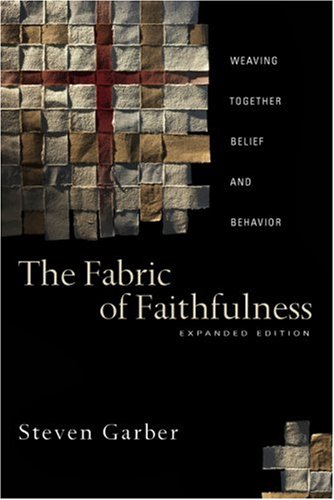 Fabric of Faithfulness: Weaving Together Belief and Behavior
Fabric of Faithfulness: Weaving Together Belief and Behavior Steven Garber (IVP) $17.00 Again, I have written about this often, and some know that although it is a serious book to read carefully, to savor the rich sentence and ponder the incisive cultural analysis, it is, certainly, one of the great books of our time. I would rank it — if I really had to do such a thing — in my own top ten of best books I’ve ever read. You may know his somewhat more popular and recent
Visions of Vocation: Common Grace for the Common Good (which I named as the book of the year when it came out in 2014.)
Here is the very short version of this wonderfully rich and wise book: Garber — always the good listener — interviewed a handful of folks who were approaching or in the beginning of their mid-life years, people he seemed to think were living well, their faith intact and lively, inviting them to think back on their college years. What happened to them, he wondered, that shaped them when they were in those “critical years.” Ends up, almost everyone who had “kept on keeping on” over the long haul of their lives, with their idealistic vision of culture-shaping and whole life discipleship, said the same sort of things. People whose faith was integrated into their real lives, those who had a robust vision of vocation and related their discipleship to their careers and callings and public lives, who were active in church and even through hardships were not giving up or “privatizing” their faith, all had profound and shaping experience in college. They all in on way or another told of the same three things. I was one of those people interviewed in that book, and it rings true. Exactly.
Those profound experiences, the sort of faith formation that lasted in healthy ways, were — in his research developed from these many interviews — described as learning to (a) have a commitment to true truth, (2) having a mentor that showed that these Biblical truths could be lived out in the real world (moving, that is, from head to heart, or from conviction to character), and (3) the experience of finding and forging life-long friendships in those years. And so it is that Fabric of Faithfulness shows that these three things — to use Stanley Hauerwas’s alliterative phrase, “conviction, character, community” — should matter to those who are in college. The first edition of the book actually had as the subtitle “weaving together belief and behavior in the college years” indicating it was perhaps written for collegiates. As it was.
Alas,
FoF may be a bit too serious-minded for many young students (although there are good stories, references to movies, novels, discussions of pop music and the like.) It is a classic within this genre of formational work for young adults and it is well, well worth studying closely for those who have some basic vocabulary and cultural awareness under their belts. It is no accident (and certainly no exaggeration) that each of the above books for students have been significantly informed by conversations of consequence with Steve and with close readings of his work over the years.
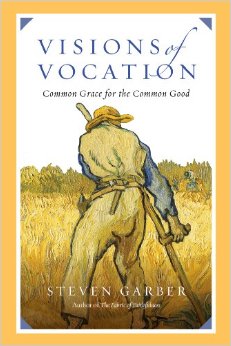 The authors listed above, and this Dallastown bookseller agree: Garber’s work is important, mature, sophisticated, and eloquent. Fabric… is well worth reading, and would make a great book to give to a mature student, perhaps a college senior or one going off to grad school. In fact, give her or him both of Garber’s wondrous books: a little set of FoF and VoV. Both books are, among other things, about this fundamental question: w
The authors listed above, and this Dallastown bookseller agree: Garber’s work is important, mature, sophisticated, and eloquent. Fabric… is well worth reading, and would make a great book to give to a mature student, perhaps a college senior or one going off to grad school. In fact, give her or him both of Garber’s wondrous books: a little set of FoF and VoV. Both books are, among other things, about this fundamental question: w
hat does it mean to care, and, then how can we learn to care well, and what do we do with what we know? In other words, what difference does education make if it doesn’t touch our deepest desires and habits of heart and how we live. Wow.
BONUS: FOR PARENTS OF COLLEGE AGE STUDENTS OR OLDER TEENS
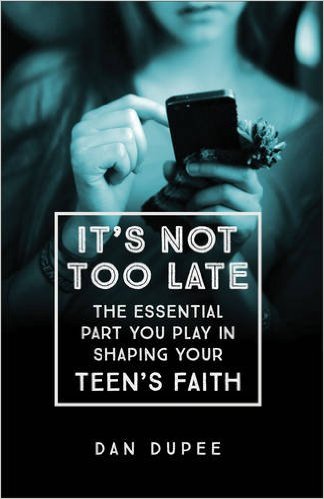 It’s Not Too Late: The Essential Part You Play in Shaping Your Teen’s Faith Dan Dupee (Baker Books) $15.99 Okay, I know some of you now are fretting, worrying about making that long drive back from taking your daughter or son to college for the first time. Or, maybe — as some of us know – you are maybe looking forward to sending ’em back to school; maybe the summer home was a bit stressful at times. This empty nest thing is a crazy roller coaster ride of emotion, even if the nest isn’t empty yet. Maybe you are wondering if your role as a parent has pretty much reached its climax, that from here on out you’ll just have to hope for the best.
It’s Not Too Late: The Essential Part You Play in Shaping Your Teen’s Faith Dan Dupee (Baker Books) $15.99 Okay, I know some of you now are fretting, worrying about making that long drive back from taking your daughter or son to college for the first time. Or, maybe — as some of us know – you are maybe looking forward to sending ’em back to school; maybe the summer home was a bit stressful at times. This empty nest thing is a crazy roller coaster ride of emotion, even if the nest isn’t empty yet. Maybe you are wondering if your role as a parent has pretty much reached its climax, that from here on out you’ll just have to hope for the best.
As we’ve explained in another review, Dupee’s first hand research from hundreds of conversations with many focus groups and gathering input from teens, college students and their parents, parenting of older teens obviously changes from the parenting skills we exercised when the kids were little. But this book is very good news for most: it is not too late. This is the best book of which we know for parenting the college age teen, the young adult transitioning out of the house. They do want our involvement, parents, and Dan shows you how to stay sane and influential in these so-called critical years. It’s Not to Late is a one-of-a-kind resource and it would be great for some parents to have it early this fall. Believe me.
BookNotes

SPECIAL
DISCOUNTANY ITEM MENTIONED
10% off
order here
takes you to the secure Hearts & Minds order form page
just tell us what you want
inquire here
if you have questions or need more information
just ask us what you want to know
Hearts & Minds 234 East Main Street Dallastown, PA 17313 717-246-3333
 The other day a well-educated friend asked me about what book to give her soon-to-be heading off to college daughter. Just a few short months ago, she was mostly known as a high school graduate; within a few weeks she will be a first year college student. It’s a big transition and a new identity, freighted with all kinds of joys, concerns, fears, excitement, opportunities, shaped by that biggee: change. Ch-ch-ch changes, indeed.
The other day a well-educated friend asked me about what book to give her soon-to-be heading off to college daughter. Just a few short months ago, she was mostly known as a high school graduate; within a few weeks she will be a first year college student. It’s a big transition and a new identity, freighted with all kinds of joys, concerns, fears, excitement, opportunities, shaped by that biggee: change. Ch-ch-ch changes, indeed. Make College Count Derek Melleby (Baker Books) $12.99 Okay, okay, I’ve mentioned this a lot over the years. Derek is one of my best friends. Our bookstore is mentioned in it as a resource for young adults trying to make their way as a responsible, thoughtful faithful college student. Still, as unbiased as I can be, I want to insist that it truly is the best book of its kind, the only really great book I know of that I’d give to a recent high school grad that is a general sort of introduction to the biggest questions to ask and answer as one is entering college.Melleby’s MCC is Ideal for those heading to school for the first time although some entering their second year might even like it.
Make College Count Derek Melleby (Baker Books) $12.99 Okay, okay, I’ve mentioned this a lot over the years. Derek is one of my best friends. Our bookstore is mentioned in it as a resource for young adults trying to make their way as a responsible, thoughtful faithful college student. Still, as unbiased as I can be, I want to insist that it truly is the best book of its kind, the only really great book I know of that I’d give to a recent high school grad that is a general sort of introduction to the biggest questions to ask and answer as one is entering college.Melleby’s MCC is Ideal for those heading to school for the first time although some entering their second year might even like it. King of the Campus Stephen Lutz (House Studio) $14.99 Again, I’ve suggested this before and carry it to any event where we sell books to college students. My own blurb on the back shouts my enthusiasm: there isn’t any other book on the market that does what this very cool paperback does. Yeah!
King of the Campus Stephen Lutz (House Studio) $14.99 Again, I’ve suggested this before and carry it to any event where we sell books to college students. My own blurb on the back shouts my enthusiasm: there isn’t any other book on the market that does what this very cool paperback does. Yeah! Learning for the Love of God: A Student’s Guide to Academic Faithfulness Donald Opitz & Derek Melleby (Brazos Press) $14.99 I wonder if there is any other book I so enjoy selling, feel so glad to get into the hands of young students? It is not ponderous or weighty but has the potential to revolutionize lives, faiths, and futures. I really believe in the power of this book, and want to invite you to send some out to college students you love.
Learning for the Love of God: A Student’s Guide to Academic Faithfulness Donald Opitz & Derek Melleby (Brazos Press) $14.99 I wonder if there is any other book I so enjoy selling, feel so glad to get into the hands of young students? It is not ponderous or weighty but has the potential to revolutionize lives, faiths, and futures. I really believe in the power of this book, and want to invite you to send some out to college students you love. Fabric of Faithfulness: Weaving Together Belief and Behavior Steven Garber (IVP) $17.00 Again, I have written about this often, and some know that although it is a serious book to read carefully, to savor the rich sentence and ponder the incisive cultural analysis, it is, certainly, one of the great books of our time. I would rank it — if I really had to do such a thing — in my own top ten of best books I’ve ever read. You may know his somewhat more popular and recent Visions of Vocation: Common Grace for the Common Good (which I named as the book of the year when it came out in 2014.)
Fabric of Faithfulness: Weaving Together Belief and Behavior Steven Garber (IVP) $17.00 Again, I have written about this often, and some know that although it is a serious book to read carefully, to savor the rich sentence and ponder the incisive cultural analysis, it is, certainly, one of the great books of our time. I would rank it — if I really had to do such a thing — in my own top ten of best books I’ve ever read. You may know his somewhat more popular and recent Visions of Vocation: Common Grace for the Common Good (which I named as the book of the year when it came out in 2014.)  The authors listed above, and this Dallastown bookseller agree: Garber’s work is important, mature, sophisticated, and eloquent. Fabric… is well worth reading, and would make a great book to give to a mature student, perhaps a college senior or one going off to grad school. In fact, give her or him both of Garber’s wondrous books: a little set of FoF and VoV. Both books are, among other things, about this fundamental question: w
The authors listed above, and this Dallastown bookseller agree: Garber’s work is important, mature, sophisticated, and eloquent. Fabric… is well worth reading, and would make a great book to give to a mature student, perhaps a college senior or one going off to grad school. In fact, give her or him both of Garber’s wondrous books: a little set of FoF and VoV. Both books are, among other things, about this fundamental question: w It’s Not Too Late: The Essential Part You Play in Shaping Your Teen’s Faith Dan Dupee (Baker Books) $15.99 Okay, I know some of you now are fretting, worrying about making that long drive back from taking your daughter or son to college for the first time. Or, maybe — as some of us know – you are maybe looking forward to sending ’em back to school; maybe the summer home was a bit stressful at times. This empty nest thing is a crazy roller coaster ride of emotion, even if the nest isn’t empty yet. Maybe you are wondering if your role as a parent has pretty much reached its climax, that from here on out you’ll just have to hope for the best.
It’s Not Too Late: The Essential Part You Play in Shaping Your Teen’s Faith Dan Dupee (Baker Books) $15.99 Okay, I know some of you now are fretting, worrying about making that long drive back from taking your daughter or son to college for the first time. Or, maybe — as some of us know – you are maybe looking forward to sending ’em back to school; maybe the summer home was a bit stressful at times. This empty nest thing is a crazy roller coaster ride of emotion, even if the nest isn’t empty yet. Maybe you are wondering if your role as a parent has pretty much reached its climax, that from here on out you’ll just have to hope for the best.